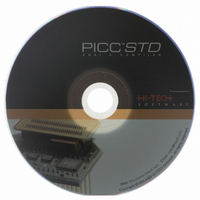SW500005 Microchip Technology, SW500005 Datasheet - Page 3

SW500005
Manufacturer Part Number
SW500005
Description
PICC STD
Manufacturer
Microchip Technology
Type
Compilerr
Series
PIC10/12/16r
Specifications of SW500005
Supported Families
PIC10, PIC12, PIC16
Core Architecture
PIC
Software Edition
Standard
Kit Contents
Software And Docs
Mcu Supported Families
PIC10/12/16
Tool Type
Compiler
Lead Free Status / RoHS Status
Not applicable / RoHS Compliant
For Use With/related Products
PIC10, PIC12, PIC14, PIC16, PIC17
Lead Free Status / Rohs Status
Lead free / RoHS Compliant
Other names
019
778-1000
778-1000
778-1000
778-1000
Tech Tip:
A Spotter’s Guide
The phrase "buffer overflow"
people who write programs which exhibit these mythical beasts are even unaware of what they are or why
they are a problem.
#include <string.h>
main() {
/* assume precious==7
*/
}
A word of warning: do not assume
version of
functions in the Standard Library, it will not necessarily give you back a NUL-terminated string even if
you give it one to work with. If its source is a long but valid string, and its destination is a shorter buffer, it
will fill the buffer with characters from the string but it will NOT terminate that buffer with a '\0'.
The line with
wherever
before a newline;
buffer[4]
though, that
There are many more possible ways to overflow a
meant to go. Sometimes the effect might not be noticeable, but you can never be sure. And while the
humble string or character array is the most common target, buffer overflows are not type-bigots - they
will strike anything they can touch.
To Slay the Monster
When hunting them, the first thing to look for is functions which write into arrays without any way of
knowing the amount of space available.
If you get to define the function, you can pass a length parameter in or ensure that every array you ever
pass to it is at least as big as the hard-coded maximum amount it will write.
If you are using a function someone else (say, the compiler vendor) has provided then avoiding
functions like
arrays they can never know the size of, is a good start.
Make sure that functions like the
them - store a '\0' in the last element of each array involved just before you call the function, if
necessary.
Good hunting
#include <string.h>
main() {
}
const char greet[] =
char buffer[5];
char precious = 7;
strcpy(buffer,
const char greet[5] = "hello";
char buffer[6];
strcpy(buffer, greet);
memcpy(buffer, greet,
char precious = 7;
gets()
. The line with
strcpy()
fgets()
greet);
sizeof buffer);
gets()
gets()
"hello";
gets()
is getting its input from) enters at most 4 characters
Beware the Buffer Overflow
, and has its own set of fangs. Most significantly, unlike all the other
, which take some amount of data over which you have no control and stuff it into
does not eat the '\n' like
might not be a buffer overflow, if the user (or
fgets()
cannot tell that it is not allowed to write past
Here's a buffer overflow. The constant array named
contains 6 characters, which
there is only room for 5. What will probably happen is that the last
character (the invisible '\0' that terminates the string "hello") will be copied
into the space formerly known as
precious
can never overflow its buffer. Note,
str...()
strncpy()
is almost making it into the mainstream press these days, but many
Now we've fixed the first problem by making
to hold all of
is smaller. "How?" you ask. By making
that is not a string, i.e. a char array that has no terminating '\0'.
The
copying until it finds a zero byte, if that ever happens.
The
still does (possibly unquantifiable) Bad Things, as it tries to copy
from one byte past the end of
contains the 7 we put into it will be violated.
memcpy()
strcpy()
family which expect NUL-terminated strings actually get
gets()
will save you: it is, unfortunately, not simply a bounded
buffer
greet
is better, because it is guaranteed to stop, but it
now will not know where to stop, and will keep
does.
, the
, writing data in all sorts of places it was never
strcpy()
strcpy()
precious
greet
tries to copy into
is then broken because
.
, and the assumption that
#include <stdio.h>
main() {
}
greet
char buffer[5];
gets(buffer);
fgets(buffer, sizeof
buffer
into a char array
greet
buffer, stdin);
buffer
big enough
str...()
actually
where
greet
Page 3




